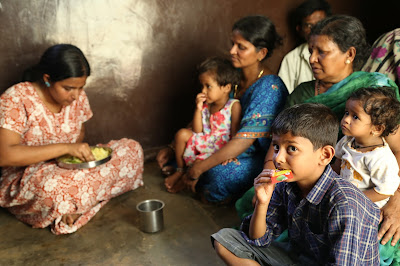NEVER TOO EARLY TO START THE CONVERSATION
Awareness
is the first step to preventing and responding proactively to sexual abuse.
 The
last week of school at Shanti Bhavan before Christmas break is always abuzz
with activity -- from wrapping up with semester exams to preparing for Santa’s
arrival. While the children excitedly discuss how they plan to spend time with
their families, the grown-ups have more serious thoughts on their minds.
The
last week of school at Shanti Bhavan before Christmas break is always abuzz
with activity -- from wrapping up with semester exams to preparing for Santa’s
arrival. While the children excitedly discuss how they plan to spend time with
their families, the grown-ups have more serious thoughts on their minds.
Their
concern is translated into long chats with the children, first individually and
then as a group in the school assembly on matters concerning personal safety,
staying hygienic and how best to handle difficult family situations like
alcoholism, death of a relative, and violence.
“We
feel nervous to have the children away from us but they need to be with their
parents and siblings. They cannot lose touch with their families,” says Ms.
Raji who juggles dual roles as head matron and class teacher for the
pre-school. While there is plenty of anxiety in letting the children out of
their sight and care, the caretakers also understand the importance of family
bonding and re-connection, for both parents and children alike.
In
my role as a part-time teacher at the school, and as a former student and a
trainee counselor, I cannot overlook the need to talk openly to the children,
especially on the dangers of being sexually abused. I had an opportunity to do
so at the school assembly last week. I began my talk by deconstructing two of
the most common myths around sexual abuse: the first being that only girls get
abused, and the second, most abusers happen to be strangers. “70% of the time
the person who commits sexual abuse is someone whom you trust and love. They
are within the four walls of your home,” I shared my thoughts in an emphatic
tone.
“A
person can affectionately kiss you on your cheeks or forehead or your hand. Not
your lips. Touching your breasts, your thighs, your buttocks and between your
legs is not right,” I continued, trying to ignore the loud, shy giggles from
the younger children in the front rows. The older children listened attentively
even though I wasn’t telling them anything new. This conversation takes place
every year when the vacations are just round the corner.
Remembering
stories of unpleasant experiences that my peers had encountered when we were
growing up, I added, “The adults whom you trust, such as your parents or
grandparents, cannot make you feel guilty for reporting abuse to them. If they
try to blackmail you into keeping quiet about it, you should let your teachers
and housemothers know about it.” I distinctly recalled the moment when my own
grandmother yelled at me for complaining about her son -- my uncle – to the
school staff about making me feel uncomfortable with his conduct when I was in
the eighth grade. Maintaining family honor cannot be an excuse for silencing
abuse. Abuse is always wrong. Nothing can make it right.
I’ve
come to strongly support the culture in Shanti Bhavan of open discussion and
transparency surrounding topics such as this though there are some who are of
the belief that by talking to children about such issues, we unnecessarily pike
their curiosity and mar their innocence. Children are the most vulnerable
targets of abuse in any form, be it sexual, physical or mental. By educating
them on this, we help them take the first step towards protecting themselves through
awareness. Being aware means being conscious of their surroundings and relationships,
especially when something is amiss.
By
taking on a preventive approach, we help children arm themselves with not just
the knowledge but also the courage to speak up when the perpetrator tries to
manipulate them into silence. By failing to do so, we are allowing child
abusers to walk away free. Childhoods are lost to the trauma of abuse. The scars remain for the rest of ones life.
It’s
never too early to start the conversation.



This is so very important, and I applaud you for addressing this issue. I just finished your book today and learned so much. I was actually in India this summer (I'm from the US) visiting my husband's family who runs a residential school in Davangere, called Rasmi. We visited the school, and after coming back to the US and seeing Daughters of Destiny, I noticed many similarities. It seems so overwhelming knowing how many students in the world are lacking in education. For those of us given the opportunity to study, it becomes our responsibility to share our knowledge and skills in any way we can, and it is reassuring to see you, and other graduates of Shanti Bhavan, doing just that. Thank you.
ReplyDelete